There are many paths to the top of the mountain, but the view is always the same.
― Chinese Proverb
Are you ready to hear something alarming and, quite frankly, intimidating?
Do a quick search on Google for the question “what is spirituality?” and you’ll receive 3,000,000,000+ results in less than a second.
(Since writing this article, the numbers have almost certainly gone up!)

Soul Work Compass Course:
Feeling lost, stuck, and trapped in repetitive cycles of pain? Discover your Soul's Compass to reclaim your purpose and find your path to freedom.
⭐️⭐️⭐️⭐️⭐️ "I have been a long-time subscriber to their website, and it’s one of my favorites by far ... It is rare to find this type of teacher." – Shar B.
Let’s pause and rewind for a moment.
Just think about what that means.
3,000,000,000+ results means that there are three billion different voices, perspectives, backgrounds, and beliefs all trying to answer the same single question.
Three billion results means that there are three billion different answers to the question “what is spirituality?” And that’s only on the internet.
Problem:
How the heck are you meant to find out what spirituality is (and even what’s the right path for you to follow), with so much information?
Solution:
There’s a reason why you have something called intuition (aka. your inner tuition). The answers are always within you and it’s your sovereign right to take what resonates and leave the rest.
With that being said, I’m attempting the mammoth undertaking of simplifying and distilling everything I know, have experienced, and have researched from a wide range of perspectives on spirituality – all to help you find your own answers.
For your convenience, I’ve broken this article down into easily-digestible parts:
Table of contents
Spirituality vs. Religion: What’s the Difference?
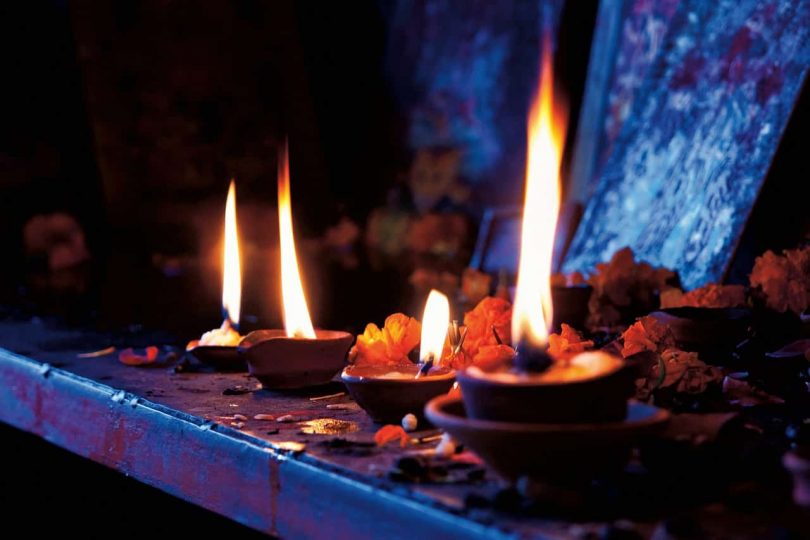
Firstly, let’s create some clarity in the realm of spirituality vs. religion. What’s the difference?
Want to get LonerWolf at the top of your Google search results?
And are you more of a spiritual or religious person?
Here’s a simple distinction between spirituality vs. religion:
Spirituality is connecting to the Divine through your own personal experience. It is primarily concerned with finding, experiencing, and embodying one’s true spiritual nature.
Religion is connecting to the Divine through someone else’s experience. It is primarily concerned with believing in, following, and obeying the rules created by a certain Deity or spiritual teacher.
Historian and philosopher, Yuval Noah Harari explains the contrast between spirituality and religion in this way:
Religion is a deal, whereas spirituality is a journey.
Religion gives a complete description of the world, and offers us a well-defined contract with predetermined goals. ‘God exists. He told us to behave in certain ways. If you obey God, you’ll be admitted to heaven. If you disobey Him, you’ll burn in hell.’ The very clarity of this deal allows society to define common norms and values that regulate human behaviour.
Spiritual journeys are nothing like that. They usually take people in mysterious ways towards unknown destinations. The quest usually begins with some big question, such as who am I? What is the meaning of life? What is good? Whereas many people just accept the ready-made answers provided by the powers that be, spiritual seekers are not so easily satisfied. They are determined to follow the big question wherever it leads, and not just to places you know well or wish to visit.
Spirituality Vs. Religion
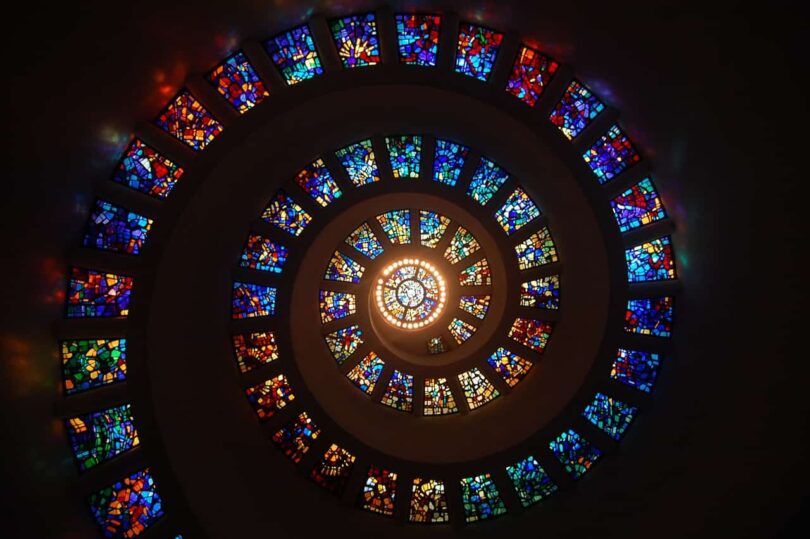
Below, I’ll break down the overall difference between spirituality and religion even further:
| Spirituality: | Religion: |
| Personal | Community-oriented |
| Emphasizes wisdom | Emphasizes knowledge |
| Goal is love and freedom | Goal is obedience and salvation |
| Feeling-based | Rule-based |
| Focuses on experiencing internal Divinity | Focuses on obeying external Divinity |
| Present-oriented (heaven is within you now) | Future-oriented (heaven is where you go when you die) |
| Oneness-oriented (we are all One) | Duality-oriented (good/evil, right/wrong, heaven/hell) |
| Creates closeness | Creates separateness |
| Informal | Formal |
| Promotes joy, spontaneity, and compassion | Promotes self-sacrifice, duty, and pity for others |
| Self-directed | Authority-directed |
| Experiential | Theoretical / belief-based |
Can you understand the difference between spirituality and religion a little better now?
Let me know what you think in the comments: are you more spiritual or religious?
Yes, it is possible to be “spiritual but not religious.” It is also possible to be religious but not spiritual – or a little bit of both. But it’s useful to determine what side you lean more towards: it will help you make clear life choices that align with your true needs, values, and desires.
If you’d like to explore this difference in-depth, we explore it further in our article: Spirituality vs Religion: 11 Differences (Pros and Cons).
The Difference Between Spirituality and Spiritualism
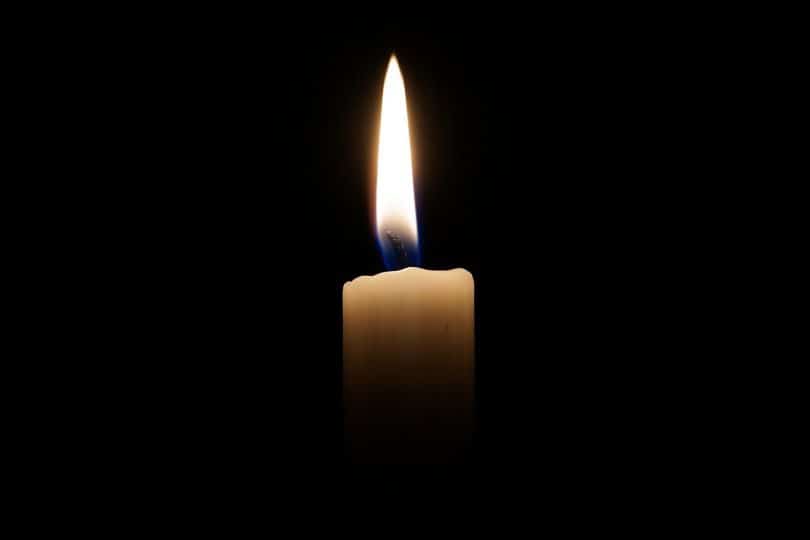
Here’s another area that we need to shed some light on.
What’s the difference between spirituality and spiritualism?
They sound awfully similar and can easily be mixed together and mistaken for each other. So let’s create some clarity here.
Would you like to save this?
Your information will never be shared.
Broadly defined, spirituality is a way of life in which a person seeks to connect to the Divine or their True Nature.
Spiritualism, on the other hand, is a movement based on the belief that we can connect with departed souls.
Spiritualists, primarily seek to make contact with the dead and thereby gain knowledge, insight, and even healing through such a method.
Can spiritualists be spiritual, and can spiritual seekers be spiritualists?
Yes, absolutely.
Many people benefit from the belief of gaining assistance from the spirits of the dead. For some, directly communing with departed souls forms an important part of their life path. For others, spiritualism has indirectly provided hope, emotional relief, acceptance of life and death, and other profound inner benefits where nothing else could.
Practice healthy caution …
However, it must be noted here that it’s not necessary to be interested in or possess psychic abilities (such as clairvoyance, clairaudience, etc.) or mediumship to successfully walk the spiritual path.
In some instances, spiritualism can become a distraction – an endlessly exciting rabbit hole to get lost in – that actually distances one from the whole point of spirituality: to unite with one’s True Nature.
When spiritual guidance is endlessly sought outside of ourselves (in the form of mediums, spirits, etc.), rather than inside of ourselves, it can become an obstacle – particularly if Spiritual Liberation is the goal of a person’s life.
Furthermore, it’s wise to be practice caution and discernment in the spiritualist field. Many people have been taken advantage of (and continue to be used every day) by fraudulent psychics, channels, and mediums who claim to have special powers but are only in it for money or status.
Is There “One True” Spiritual Path?

As we can see so far, spirituality is extremely personal: it means something different for everyone. Therefore, there is no one “true” spiritual path.
If anyone tries to claim that their spiritual path is the “one true way,” they are adopting a religious mindset, not a spiritual mindset. (And as we’ve seen, religion is based on dogma whereas spirituality is based on personal experience.)
Unlike religion, your spiritual path is tailored exclusively to your emotional, mental, and spiritual needs. This means that your spiritual path will shift, change, morph, and evolve alongside you many times throughout your life.
Transcendent vs. Immanent Spirituality
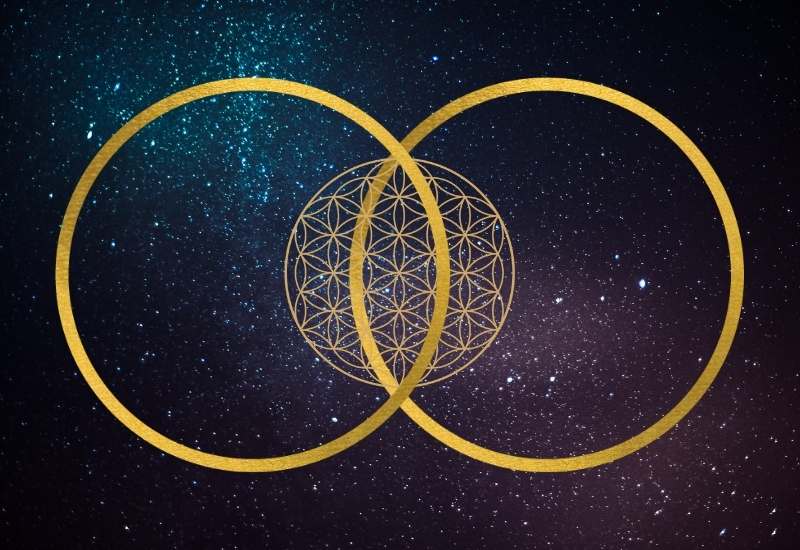
Before we define the five common spiritual paths out there, it’s extremely helpful to understand one simple point: spiritual paths can be either transcendent or immanent (and in some cases both).
What do I mean by transcendence or immanence?
Well, transcendent spirituality sees the Divine as greater than us, beyond this world, and something we attain or self-realize.
For over 12 years, we've poured our hearts into creating free content on this website. Unlike many platforms, we believe this guidance should be accessible to everyone. If this post empowered you in any way, please consider making a donation to keep us going. Any amount (one-time or ongoing) makes a huge difference.
Immanent spirituality, on the other hand, sees the Divine as living among us, very much apparent in this physical world, and something we embody.
There is no one “right or wrong” approach to spirituality here: whether you favor transcendent or immanent spirituality all depends on your unique perspective of reality.
One example of a transcendent path is Neo-Advaita, whereas Animism is a reflection of immanent spirituality. An example of a path that combines both transcendent and immanent spirituality is Panentheism (as in, the Divine is both within all and above all).
5 Common Spiritual Paths (List)

Spirituality is like an eclectic rainbow: there are endless varieties of paths and practices out there.
What matters is that you choose something that feels true to you.
And remember that what you like and need now will likely evolve in the future. Why? The reason is that you’re an eternally evolving creature! When you stop going through changes you’re in a state of living death (and that obviously isn’t very healthy is it?!).
Therefore, don’t be afraid to dabble and then deeply commit to something that feels true to you.
So, to assist in your soul searching, what are the most common spiritual paths out there?
To keep this section succinct, I’ve divided the following paths and practices into five categories. (Keep in mind that some of these practices and paths can and do overlap):
Earth-Based Spirituality
(i.e. connection with the earth or the material realm as a gateway to the Divine)
Examples of practices within this spiritual path include:
Metaphysical Spirituality
(i.e. connection with the non-material realm as a gateway to the Divine)
Examples of practices within this spiritual path include:
- Energy Healing (Reiki, Chakra healing, etc.)
- Esotericism / Occultism
- Spirit guide / Deity contact
- Divination (Palmistry, Tarot cards, Pendulum dowsing, etc.)
- Witchcraft / Magick
- Channeling
- Astrology
- Mysticism
- Soul retrieval
Body-Based Spirituality
(i.e. using the body as a gateway to the Divine)
Examples of practices within this spiritual path include:
- Yoga
- Tai Chi / Qi Gong
- Breathwork
- Tantra
- Chanting / Mantras
- Dancing
Heart-Based Spirituality
(i.e. using the heart as a gateway to the Divine)
Examples of practices within this spiritual path include:
- Devotion
- Prayer
- Gratitude
- Letting go
- Unconditional love
- Cultivating compassion
- Finding life purpose
- Finding the meaning of life
- Spiritual relationships
- Heartfulness (heart-based mindfulness)
- Philanthropy / serving others
- Listening to / developing intuition
Mind-Based Spirituality
(i.e. using the mind as a gateway to the Divine)
Examples of practices within this spiritual path include:
- Non-duality
- Meditation
- Mindfulness
- Visualization
- Self-Hypnosis
- Contemplation
- Positive Thinking
- Trance / altered states of consciousness
- Law of Attraction
- Solitude
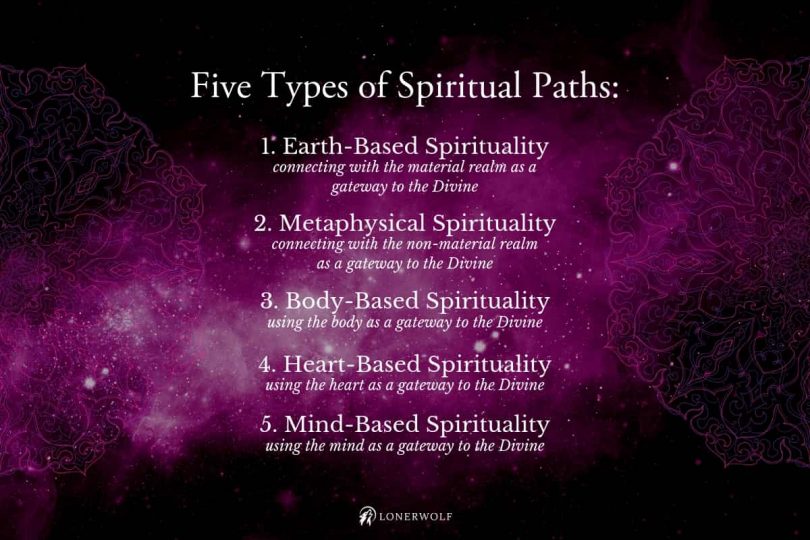
It’s impossible to include every single spiritual path/practice here, but I hope you now have a smorgasbord of options to explore.
Remember, spirituality is like a tree. Some paths and practices are closer to the central trunk which is the ultimate goal of spirituality (awakening, Oneness, and liberation from suffering).
Other paths and practices, on the other hand, form the peripheral twigs: they’re still important, but perhaps to a lesser degree.
It’s up to you to ultimately figure out what your ultimate spiritual goal is, and what practices are going to help you get there. Really, that’s the joy that comes with walking your own spiritual path.
When Spirituality Overlaps With Psychology
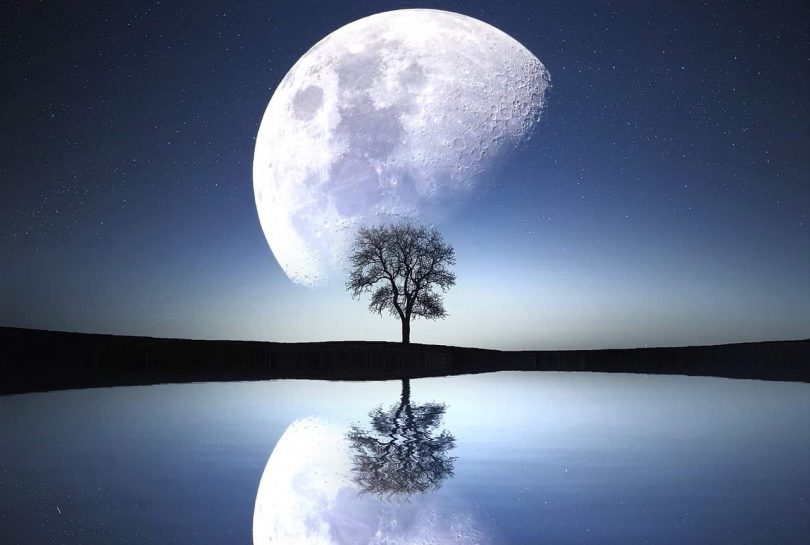
Eastern Spirituality celebrates the dissipation of the ego, Western Psychology champions the strengthening and integration of the ego. As it turns out, they are both right. Once we have done enough work to establish our sense of self, we organically merge with the bigger ocean.
– Jeff Brown
Summarized briefly, spirituality + psychology = psycho-spirituality.
Psycho-spirituality is a combination of:
- Heart and Mind
- Heaven and Earth
- East and West
It’s an integrative, balanced approach to life that we advocate on this website and a path I strive to bring into my everyday existence.
But why bring psychology into spirituality?
Spirituality without psychology is vague, ungrounded, and disconnected from daily life. In and of itself, spirituality typically doesn’t deal with the mental and emotional issues buried beneath the surface of our lives. Thus, when we only focus on spirituality, we tend to fall into the trap of spiritual bypassing, which is using spirituality to avoid our everyday life issues – causing great harm to ourselves and others.
On the other hand, psychology without spirituality is dry, overly theoretical, and disconnected from the fresh breeze of spiritual insight. Working on ourselves and our issues is important, but if that’s only what we focus on, our lives end up feeling empty and dull.
If you’re interested in walking the spiritual path, I strongly recommend incorporating some kind of psychological work into your practice. This could be as simple as seeing a therapist every fortnight or reading self-help books.
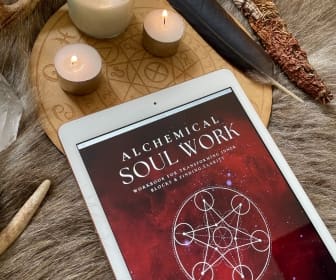
Feeling stuck?
Take the first step on your path of transformation. The Alchemical Soul Work Workbook is a practical guide to help you heal, grow, and reconnect with your inner purpose.
Whatever the case, something is better than nothing. It’s best to flush out the toxins rather than letting them accumulate and fester within your mind and heart.
Common psycho-spiritual inner work practices include:
- Journaling
- Automatic Writing
- Art
- Dream Work
- Learning how to love yourself (self-love)
- Inner Child Work
- Shadow Work
- Archetype Work
- Active Imagination (“Astral Travel”)
- Divine Feminine / Divine Masculine Work (anima and animus)
- Hypnotherapy (including self-hypnosis)
- Trauma Work (somatic experiencing, body-centered mindfulness)
Click on any topics you’re interested in to find out more. Many topics we’ve written about on this website, or provided premium resources for in our shop.
The Spiritual Awakening Process
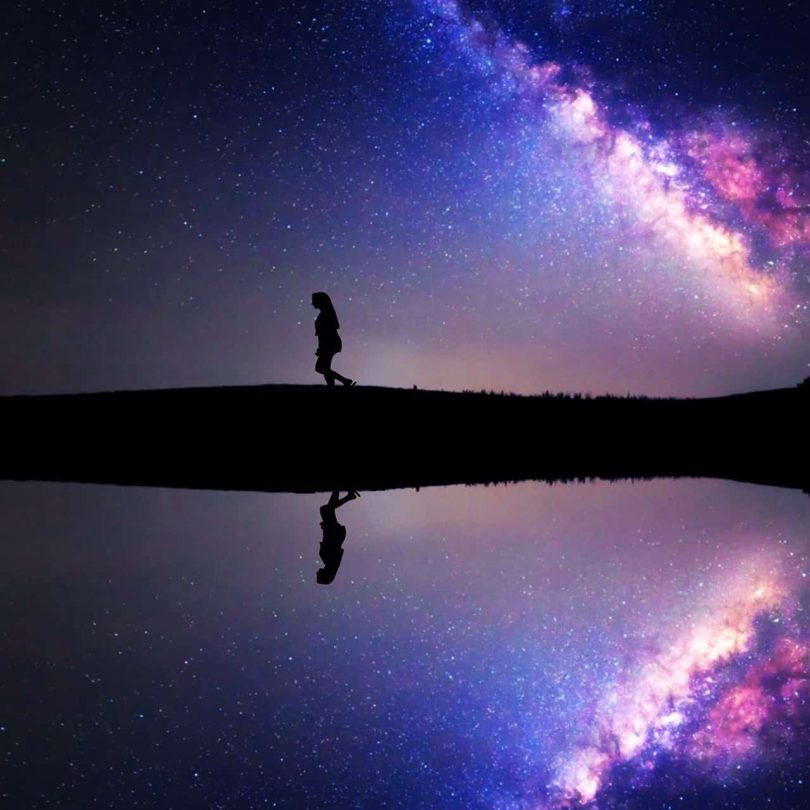
There are many layers to spirituality and the spiritual path.
Most people who become interested in spirituality have gone through, or are going through, a spiritual awakening process of some kind. After or simultaneously during this experience, they might also experience a painful phenomenon known as the Dark Night of the Soul.
I’ll clearly differentiate what these stages in human evolution mean below:
What is Spiritual Awakening?

Quite simply, a spiritual awakening is an experience of entering the spiritual search.
Often, spiritual awakenings happen as a result of sickness, job loss, traumatic life experiences, and big life changes such as getting married or having a child. Suddenly, the old, materialistic way of life doesn’t satisfy a person, and they start to crave more. And so begins the spiritual quest.
As I shared in my article on spiritual awakening:
Spiritual awakenings are the soul’s cry for freedom … If you have experienced a spiritual awakening, you have come to see through the lies and illusions of this world. Deep in your soul, you realize that nothing external has ever, and can ever, bring you true happiness or fulfillment. This profound realization leaves you craving for something richer, more fulfilling, and something that will make you feel whole once again.
What is the Dark Night of the Soul?
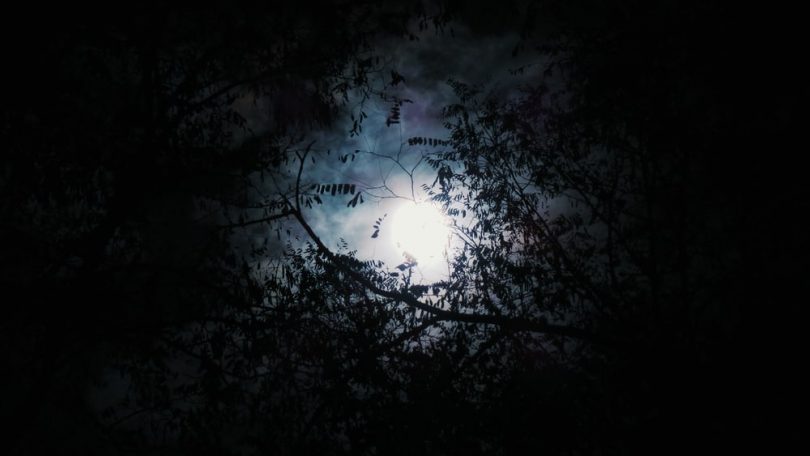
The Dark Night of the Soul was a term originally coined by the 16th-century Spanish Monk and Mystic, Saint John of the Cross. It was derived from a poem by the same name (“Noche Oscura”) that described his own painful experience.
In a nutshell, the Dark Night of the Soul is the experience of feeling totally disconnected from the Divine. This severe feeling of isolation and spiritual abandonment may accompany a spiritual awakening (having “lost” contact with Spirit) or may also emerge naturally as a result of a traumatic life experience.
As shared in our Dark Night of the Soul article:
The Dark Night of the Soul is a period of utter spiritual desolation, disconnection, and emptiness in which one feels totally separated from the Divine. Those who experience the Dark Night feel completely lost, hopeless, and consumed with melancholy. The Dark Night of the Soul can be likened to severe spiritual depression.
While the Dark Night sounds undeniably scary, it’s also a vital part of the spiritual path that motivates us to explore spirituality in the first place. Without death, there cannot be rebirth. And without dissolution, there can’t be transformation.
So if you’re reading this and you feel stuck, lost, or hopeless to find your life path, see this as a sign that you’re already on the spiritual journey. Know that there is hope and what you’re experiencing does have a meaning and purpose.
How to Start Your Spiritual Journey

The spiritual life is both deep and transcendent.
– Thomas Moore
By now you might be wondering, how do I choose my spiritual path?
Not to sound like a fortune cookie, but your spiritual path chooses you.
What I mean by this is that, deep down, your heart, soul, spirit, whatever you want to call it, knows what it needs the most to evolve, mature, heal, and transform.
But to make the process a bit easier for you, here are some steps you can take. Feel free to keep what resonates and throw away the rest:
1. Define what spirituality means to you
The power and freedom are in your hands to throw away all second-hand descriptions and define what spirituality means to you.
Remember, this is your life and your path. You don’t need to buy into a definition of spirituality that doesn’t resonate on a core level with you. Your definition of spirituality needs to feel true, and viscerally real – and if it doesn’t, throw it away and move on.
Indeed, you need to be able to really feel what spirituality is in your bones in order to find a genuine spiritual path that truly helps you.
For me, spirituality is a direct experience: it’s not a belief, it’s not a compartmentalized practice, it’s something that I strive to actively live and experience in everyday life. For instance, to me, spirituality is about growing up and waking up. It’s a uniting, present-moment force. It’s about finding out who I am and moving beyond all labels. It’s about doing and being, building up and tearing down, and experiencing the very core of who and what I am. It’s about constantly evolving, maturing, healing, and embodying the Divine that I am an inseparable part of.
Don’t worry if your definition of spirituality isn’t as long or multi-layered as mine. It doesn’t need to be. Just brainstorm or write some of your thoughts down on a piece of paper, or in your personal journal. The benefit of writing down your thoughts (i.e., journaling) is that you’ll be able to refer back to them in the future and see how your approach has morphed and evolved.
Not many people clearly define what spirituality is to them – and this results in a lot of personal confusion, frustration, and disillusionment. It’s easy to look to others for answers, but ultimately no one is living your life for you but you, and you need to define what spirituality means to you in order to authentically walk your spiritual path.
2. Think about your approach (and what you really want)
Why do you want to have a spiritual path? How committed do you want to be? When all is said and done, what are your true needs, motivations, and desires?
Asking yourself these three questions will clear up a tremendous amount of confusion and frustration. By asking the deep-and-real questions, you’re giving yourself the best chance to grow, transform, and heal.
As psychotherapist and yoga teacher Mariana Caplan writes,
To ask this question of ourselves – “Am I committed, or am I just involved?” – and give an honest answer helps us to make intelligent choices about which paths and practices are best suited for the spiritual development we seek. The problem arises when we profess one thing and live out another, because we confuse ourselves and others, and we limit our growth.
If only we could say honestly and without shame, “I engage spirituality as a hobby,” or “I want a spiritual practice that will give me some peace of mind but without any commitment or discipline,” or “I’d like to keep spirituality as my mistress but maintain comfort and security as my spouse,” or “I want to be seen as a spiritual man or woman because that will make me more sexy.”
… It is not wrong to have such an approach to spiritual development. We grow from where we are, and if we pretend to be somewhere we are not and try to move forward, we are likely to travel in a very crooked line and become more confused than necessary.
Be honest with yourself and look within. What do you truly want?
3. Choose a handful of spiritual paths/practices
Refer back to the Common Spiritual Paths and Practices part above and choose between one to five areas that interest you. Try to pick practices that you feel a genuine pull towards (even if they seem silly to your mind). Let your heart lead the way.
The reason why I advise listening to your heart is that the mind tends to deceive us easily. We believe we “have to” like this or “should” practice that. As a result, we try to live up to a mental ideal that superficially looks attractive but internally feels hollow.
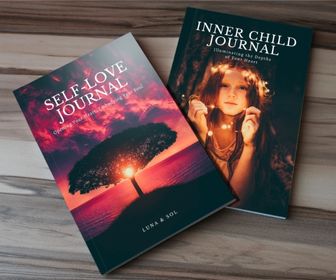
Inner Work Journal Bundle:
Ready to take your spiritual practice to new depths? Our highly-rated set of guided inner work journals leads you step-by-step through processing trauma, transmuting pain into power, and finding transformation through deep healing and self-illumination.
So go with your instincts and follow your passions – this is the best way to ensure that you’ll stay motivated.
4. Choose a psycho-spiritual practice
As I mentioned above, without psychology, spirituality can easily become ungrounded, disconnected from daily life, and can be used to bypass our inner shadows, traumas, and childhood issues.
To truly get the most out of your spiritual path, you need to also heal and mature on the personal (ego) level. This process is known as individuation. The goal of individuation is to become a Whole human being with access to all sides of your nature.
Go to the section above entitled When Spirituality Overlaps With Psychology and choose one or two practices from the list. (Please note: shadow work is an advanced psychological practice that requires a good foundation of self-love – so if you’re new to self-development, try other practices first to not overwhelm yourself.)
If you would like professional guidance, seek out transpersonal or psycho-spiritual counselors/therapists. If you can’t find any in your area, ask the professionals that are available whether they incorporate spirituality into their therapeutic approaches.
5. Combine, mix, and co-create your unique path
Using the spiritual and psychological paths and practices you’ve selected, begin to incorporate them into your daily life.
At first, you may need to formally set aside or schedule a certain amount of time every day to dedicate to your spiritual path. Think about what time of the day would be best for you (many people prefer the morning, but if you’re a night owl perhaps try the evening).
Consider setting aside 15 minutes or more a day for your spiritual practice (you can increase this amount of time as you go deeper). However, if you feel like dedicating more time to your spiritual path from the beginning, go for it! This is your path remember.
You might also like to dedicate a space in your house to your spiritual practice – even if that simply means an empty corner of a room. If you have an artistic side, you may like to create an altar if that speaks to you. Otherwise, simply create a quiet space in which you can reflect and reconnect to the Divine.
6. Ask, “what is the ultimate purpose?”
Many spiritual paths and practices are alluring on the surface, but beneath they are very limited in scope and will only get you so far.
One profoundly helpful question I keep using over and over again on my journey is, “what is the ultimate purpose of this path?” I then reflect on what spirituality means to me and my true needs, and whether they all align. If they don’t, and if I find the path/practice to be superficially pretty, but lacking on a deeper level for me, I discard it and move on.
Asking the simple question of “what is the ultimate purpose of this path?” will help you to sort the ‘wheat from the chaff’ so to speak. The result of finding such clarity is a deeper, more authentic, and enriching spiritual path.
Over to You …
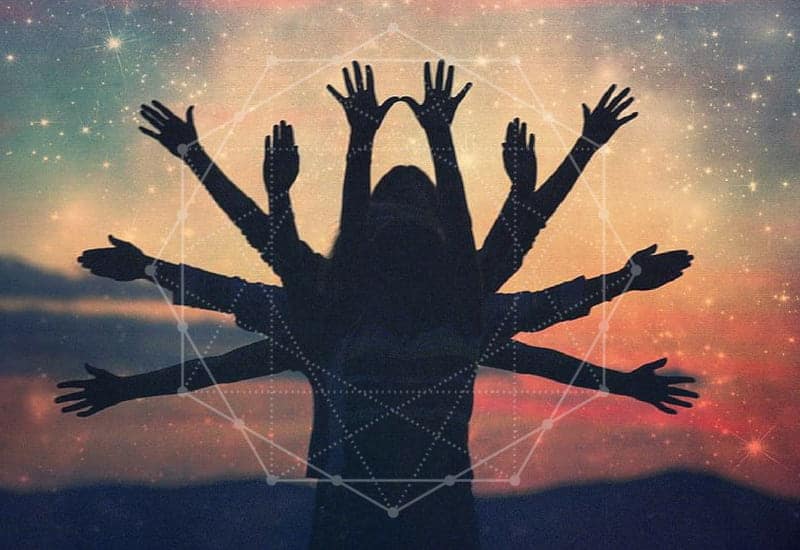
In conclusion, I’ll leave you with a beautiful quote that summarizes religion, spirituality, and the spiritual path:
Above all, be true to yourself, and if you cannot put your heart in it, take yourself out of it.
– Unknown
Tell me, what is spirituality to you? What’s the goal of your spiritual path? I’d love to hear in the comments.
Two paths to inner transformation – here’s how I can help you go deeper:
1. The Soul Work Compass Course: Feeling lost or stuck in repetitive cycles of pain? The Soul Work Compass Course is your guide to reclaiming your true purpose. In this deep yet practical journey, you’ll learn how to heal core wounds and create a tangible "Soul's Compass" to navigate life with clarity. Enroll now and find your True North!
2. The Inner Work Journal Bundle: Ready for deep transformation? This bundle includes three powerful journals – Self-Love, Inner Child, and Shadow Work – with 150+ prompts to heal wounds, integrate your darkness, and experience bone-deep change. Digital & printable. Print unlimited times.

 $3
$3
Thank you for such an interesting and helpful article. I especially loved the starting proverb. It has been my motivation recently to find the commonality behind each religion, it’s true spiritual purpose if you like, free from the shackles of obedience and the cultural influences where it evolved. Those spiritual teachers of old did come up with some good common insights. That the view from the top of the mountain is always the same regardless of how you got there is a nice analogy of this commonality.
I’m not sure that spirituality and religion can be so easily divided then. For example, some spiritual practices form communities of learning and sharing (like this one). Where would you put Buddhism. Some stricter forms might fall on the right but it’s core teaching on oneness, compassion and inner divinity is very much on the left of your division. In fact many argue that at its core, it’s more of a practical philosophy-psychology than a religion.
In considering my own spiritual path, I feel it to be spherical and multi-dimensional rather than linear. Maybe I can offer an analogy of sitting in a series of nested eggs with each layer of shell separating levels of wisdom and insight. I try various tools, as you’ve listed, to chip away at each shell. Sometimes I make a small chink in a couple of layers and I get a narrow glimpse or hope of what lies beyond, other tools enable whole sections to fall away, until finally you burst through an entire layer, like a chick blinking in the bright sun of understanding.
My commitment to finally being ‘hatched’ is 100% but I realise that I’m also still very embryonic. I will make mistakes, I will slack off at times and not work on my shell(s) at all, but that’s ok. Patience is an important part of spiritual practice. It can’t be forced.
Thanks for the inspiration and opportunity to pen and share my thoughts ❤️
I should add that it’s not necessarily enjoyable to break through a shell. It can be so uncomfortably blinding as to appear dark, frightening and confusing. Almost in parallel to early brain development in children where the firing of new neurons can leave them bewildered, agitated and seeking physical comfort and safety. Further this ‘hatching’ process could extend beyond this lifetime, beyond this current lifeform, planet and dimension.
It is indeed a fascinating field, I have a personal attraction toward synthesizing and finding the union of knowledge as well so the “Perennial Philosophy” as Huxley put it is intriguing.
That said I can see the confusion with the spiritual and religion division. To my understanding, spirituality is the act of relating to reality. The deeper we relate to reality (as in the more and more aware we become), the less sense of individual ‘self’ exists which results in an embodiment of this divine union we seek. This is the distinction between true spirituality and ‘spiritual’ knowledge. Our website serves as spiritual knowledge, it’s like a sign post pointing at true spirituality. But it’s easy to get absorbed in the sign post and not see where the sign is pointing (or to use the Buddhism proverb, “to look at the finger and forget about the moon it’s pointing toward”.)
This is where Buddhism is also a spiritual body of work, but Buddha himself said he didn’t want a religion made from his teachings and yet that’s what our dualistic minds have made it into. Even if we are to interpret it as a form of psychology, still psychology is just another lens that we look at the world through, a way of labeling this as “neurotic” and that as “projection”. It’s not true reality, therefore we’re not relating directly with reality (true spirituality) but just relating through a spiritual lens.
I hope that provides a bit of clarity.
Spirituality to me is a journey of discovery. To clean out the old lines of child abuse, strange family calamities and secrets, toxic mind states, rigid personality modes which restrict body and mind in intense fears and phobic states that cripple the thinking , and cause tense anxious flares, with suspicion of others, harsh criticism, and value judgements that can lead one to appear a narcissist without empathy or feeling for other human beings.
This has come about after much deep and meaning full searching from about 16 years of age as to who the F …I am.
Having started with Religious Instruction in the Anglican mode and then escaping from this later from Primary to High school where and interest in manual arts lead to a need to understand inner things other than the style of living I was experiencing. So It was Art School for me with an initial taste for Tibetan Llama’s (Lobsang Rampa) on the inside and the need to express what the eye mind and hands can experience via Art painting and drawing.
After this I went Buddhist for a while following the Minor Wheel . Which caused internal bursting as I could not negotiate the negative submission of inner thoughts, as my mind went bonkers the first Retreat we did with walking meditation and general mindfulness meditation in the lotus position. So like Anglican traits it was very restrictive and dogmatic and demanding on personal time and in attendance to all the Parli Book rules.
Then Art and Community experiences took over, where I met my darling wife and went on art and life journeys with her.
We travelled up here to Brisbane and fell in love with the place and people. We both after a time studied Anglo Catholic beliefs and eventually swan dived into the world and simple joys of Franciscanism . So Saint Francis helped us to join a study group to become Third Order Franciscan Brother and Sister. We became very disillusioned with this eventually with the Socio/religious politics of the Church, Pedophile problems and insensitivity to our personal inner growth needs and wants at the time.
Thank you for sharing your experience Brother Bernadine, it sounds like quite the rollercoaster of a spiritual path. I’ve tried existing paths and found similar problems to you, the structuring of spirituality starts turning spirituality from something alive and relatable to something dead, systematic and scripted.
When a master speaks, what they say carries immense wisdom and clarity, as they are relating to existence directly, embodying the divine. When we grab their words and turn it into scripture to intellectually study or a set of rituals to repeat, they lose most of the depth they carried, they become corpses of words. Keep trying and going further, eventually, the right path is the one you’ve been on all along and can only appreciate in hindsight.
Dear Mateo,
The first thing you need to become a spiritual person is the Divine blessing. Without it, you will remain as a religious person or an atheist. Once you are blessed and become a spiritual person, there is no return journey even in the most miserable situation. The spiritual journey is not an easy one. It may lead you to a stage where you would think death is more acceptable than living. But Death will not touch you until you have completed your life purpose. The life purpose will be revealed to you only at the right time. Until then your life will be very miserable because no one will understand you. You will be a strange person for them. But you will have the Divine blessing to pass through this difficult phase. He will guide you in any manner; either through your intuition or through your friend or your family member or through your enemy or sometimes even through a scrap of paper lying on the roadside.
Thank you, Mateo, for a wonderful article.
Thanks Roopa for sharing your wisdom, I’m sure it’ll be useful to many :).
Great article I blend a bit of everything you mentioned. I had a few years of immersing myself in Buddhism which psychologically speaking is immensely grounding and helpful but I found it is lacking in terms of connection . I have found open heart meditation gives me the most beautiful meditation and connection to God ( or whoever you may like to call this Divine presence) I really feel like I have found that missing piece of my personal spiritual jig saw
Thank you for sharing Melody :). I think we all carry a bit of everything but some elements might be more dominant. I agree with the importance of adding ‘heartfulness’ into our practice. I naturally am very mentally centered so psychology/philosophy are very appealing but the deeper I’ve tasted the ‘feeling’ of heart and connection into my practice, the more I’ve experienced the transformation from ‘knowledge’ to ‘knowing’. This is also one of the reasons we’re focusing more on relationships and love, true relating is like a freeway directly into a heart-centric path.
I’m put off by anybody saying “all you need to know”. My reaction is how dare you to presume what I do or do not need to know? It’s arrogant, condescending, assumes that you have some position of authority, and I’d say might be an example of something written elsewhere on this site about. “Gaslighting”. I’m of the question authority generation whose hackles go up when I not such an attitude. It puts us off to a bad start.
It’s an attempt to prevent the reader from questioning what you write. You might as well follow it with the Trumpian “trust me on this”.
I get to decide what I need to know. I might find something I decide I need to know in what you write, or I might not. You make it hard to give it a fair shake when you start like that.
Here’s what a particular timeless experience showed me about what we are doing here.
We are heard to learn how to live in the eternal now in a perfectly loving manner. We will fail. We will go around the wheel until we succeed.
A lot of highly improbable things had to happen in order for us to happen but life is the inevitable consequence of the laws of physics. This trip around the wheel may be the only one we get in the lifespan of this universe. Then other universes will be born and fail over and over to create the improbable conditions for us to be reborn. (like matter over antimatter)
The only reason we perceive the flow of time is that it is necessary for the organism we inhabit. We don’t remember not being alive. Dying is just the ultimate state of unconsciousness. You are not aware of what you are not aware of. If you are not aware of the number of universes born and going could and dark and forming a new singularity it simply doesn’t matter. All that matters is that eventually, you will wake up, inhabit a new organism capable of evolving a place to observe quantum waveform collapse and we get another chance to perfect your ability fo live as perfectly and lovingly in the eternal here now as possible. When you achieve that the clocks stop, there is no more time, there will be no more need to be reborn into a new organism. The underlying force behind it all can only be described by the word love. Hate isn’t a thing of its own, it’s merely the absence of love. We can’t perfect love in this life because we still have to kill other living things to live. When I pointed that out to a wise man he said: “It’s all god going into god”.
This isn’t all you need to know. I just hope it gives things to thing about.
Thanks for your comment Jack. I agree with you, the title can send the wrong message when taking out of the context of the rest of our work. The name of our website is lonerwolf for a reason, we encourage questioning, critical thought and seeking deeper truth (it’s listed as one of our principles). So if someone is not familiar with that aspect of our teachings, then they could use the title as an excuse for not thinking deeper.
There’s different elements at play here however. For one, ‘Some useful information to get you started’ as a title doesn’t sound very appealing. We’re competing with millions of daily articles so dualistic absolute statements like that are more appealing. More importantly, our interest is to get people to start a spiritual practice, and knowledge is often the biggest obstacle for that (a quick read of any comment section discussing the ‘right’ way to interpret script will show you that). This article explores broadly all the different paths available, that’s all that you need to ‘know’. After that, it’s a matter less of learning new knowledge and more of ‘doing’ the actual work.
Hello Mateo, Thank you for this wonderful post. I wish I could have read it 25 years ago! Everyone who is starting on a spiritual path will benefit from this very clear, comprehensive summary. I have been looking without for spiritual guidance and have to constantly be reminded that the answers lie within … and that my path is unique to me. Thank you for your wise words and for, once again, pointing to my own heart as ‘home.’
I’m so happy to hear you found the article useful Lois :). It’s amazing how easily distracted and ‘off-path’ we can go, even spirituality has become another marketplace to get lost in. But as long as we remember to always bring it back to our ‘home’, our internal sanctuary, we’ll be on the right unique path made for us.
Well, thank you Mateo for providing a working definition of religion and spirituality and the differences between them, so that we may at least know what you mean by them. Often the terms are thrown about without any clarification, and it seems to be just another dualism: spirituality is enlightened, open, tolerant (or vague, wishy-washy and heretical, depending upon your point of view ) while religion is dogmatic, self-righteous, arrogant and judgmental (or clear, uncompromising and faithful to the truth, again depending upon your point of view). Besides, the religious themselves, as well as the “spiritual but not religious” are often in a hurry to disown the term religion with all its baggage, e.g. “Christianity is not a religion, it is a relationship,” which is true, but also kind of an annoying phrase (and I say that notwithstanding having been in some sense a Christian since childhood, though I flirted with Buddhism back then, and one night as an adult during one of my periods of struggle gave serious thought to Islam and Socialism).
So I repeat: thank you for clarifying your terms. I am still not sure how helpful the distinction is. In retrospect I was probably more “religious” following your definition during precisely the periods of my life when I flattered myself that I was, and was probably perceived by others as being, more spiritual, while true spirituality and such little wisdom as I may have gained since has indeed been the product of a journey involving frequent struggle, during which my relationship with God has at times seemed close, at times far.
Why should individuals and community be opposed? Individuals need community, community is composed of individuals.
I suspect that for many the term “spirituality” rivals “religion” for its baggage.
Thank you Alexander for your thoughtful comment. I agree with you that it’s so easy to get lost in the world of language. As Wittgenstein put it; “The limits of my language are the limits of my world.” Without a clear working definition for what we mean by each word we use, what we say is meaningless in its value to communicate such an important aspect as spirituality.
And yet it’s this very medium of communication that’s a problem. If both spirituality and religion aim at communicating truth, they’re using the wrong medium, because language aims at breaking the ‘wholeness’ into its parts, in order to describe and understand it and in doing so, it loses its wholeness/truth. It’s an endless rabbit whole.
Thank you for enlightening me the meaning of spirituality. I had always coined the term with being attuned to the relationship with The Creator in a manner of understanding, not faith though. I knew there was something more to what it meant, but I could not describe it.
Wow. I’m glad I found your site. I was just starting my journey towards self-discovery and mastery seeking wisdom and deeper meaning of life.
Hello Vanessa!
Im happy you find our site helpful in your journey of self discovery and mastery. Our Involutionary teachings are expanding as we grow with the site, we plan on writing a lot more about it in the near future…particularly what we have learned the last few months here in Europe through the Involutionary groups we hosted, one of the main assets will be the changing from 5 stages to 7 stages of Involution! :)
I hope we are able to share with each other much of our discoveries! :)
Much love and warmth,
Sol
This is a truly beautiful article – so much insight in such simple, uncluttered language. Philosophy and top-class writing in one. It made my day.
Thank you Alexandra! It means a lot to me to have such beautiful readers who can relate to many of the things that I feel inside and, more importantly, they find helpful to apply in the own lives :)